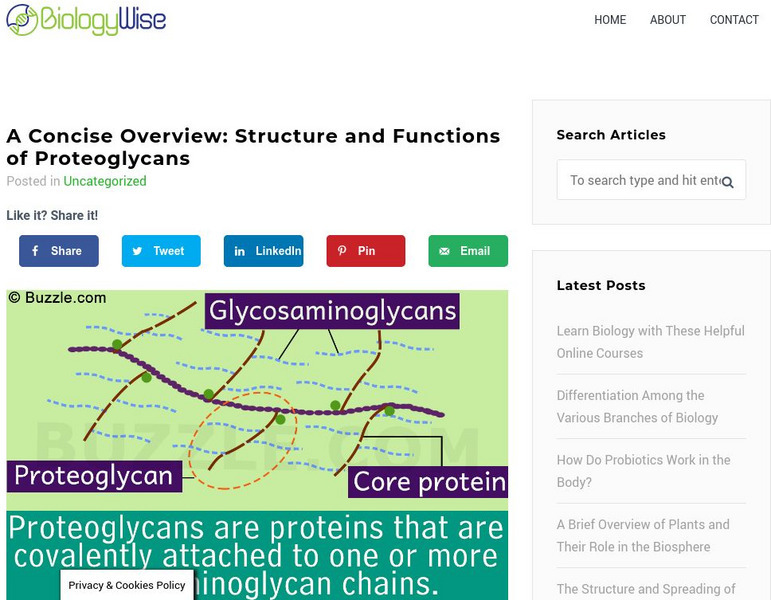BiologyWise
Biology Wise: Theories Behind the Extinction of Neanderthals
Discusses the discovery of Homo neanderthalensis and describes the different theories that have been put forward to explain why Neanderthals became extinct.
BiologyWise
Biology Wise: Information About the Hydrostatic Skeleton
Explains what a hydrostatic skeleton is and the types of organisms that have one. Describes examples from six phyla and the advantages and disadvantages of this type of skeleton.
BiologyWise
Biology Wise: 4 Basic Modes of Speciation Show How Species Evolve
Explains what the four main modes of species formation are - allopatric, parapatric, peripatric, and sympatric speciation - and provides examples. A fifth possible mode, stasipatric speciation, is also discussed.
BiologyWise
Biology Wise: Dominant and Recessive Traits in Humans
Explains what dominant and recessive traits are and how they work, and provides a list of single gene traits with the degree of manifestation if they are dominant or recessive. Also discusses co-dominance, incomplete dominance, polygenic...
BiologyWise
Biology Wise: Information About the 3 Germ Layers in Animals
Describes the stages of development in animals from conception to the formation of the blastophore and then the three germ layers - the endoderm, mesoderm, and ectoderm. Details about each of the layers are also given.
BiologyWise
Biology Wise: History of Genetic Engineering
Presents a timeline of the history of genetic engineering beginning in 1859 with the publication of The Origin of Species by Charles Darwin.
BiologyWise
Biology Wise: Structure and Functions of Proteoglycans
Proteoglycans are a type of protein that help in maintaining the integrity of connective tissue. Their chemical structure is quite complex and is explained here with the aid of labeled illustrations. Their functions in the support of...
BiologyWise
Biology Wise: Step by Step Explanation of Dna Fingerprinting Process
Explains with the help of a flowchart the steps in creating a DNA fingerprint and a few techniques that have been developed to improve accuracy and efficiency.
BiologyWise
Biology Wise: History of Dna Fingerprinting
Discusses the scientists who made discoveries about DNA and those who invented and worked on DNA fingerprinting, and some of the criminal cases that were resolved or thrown out through the use of DNA evidence. (Warning: Some of these...
BiologyWise
Biology Wise: Structure and Function of a Casparian Strip
The Casparian strip is found in the endodermis layer of a plant's roots and it assists the plant in absorbing water and nutrients from the soil. The structure of a plant root is described and the process by which the Casparian strip...
BiologyWise
Biology Wise: Famous Scientists in Genetic Research
Presents biographical information about prominent geneticists and describes the discoveries they are famous for.
BiologyWise
Biology Wise: Genetic Mutations in Humans
Discusses common mutations that occur in the human population and describes the many different types of genetic mutations and their impact.
BiologyWise
Biology Wise: Chitin: Structure, Function, and Uses
Chitin is a biopolymer that gives rigidity to exoskeletons and other protective structures of organisms, thereby preventing injury to soft internal tissues and other parts. Its chemical structure is shown and its functions are described.
BiologyWise
Biology Wise: Emergent Properties That Exist in Biology
An explanation of the concept of emergence and what it means in biology. Emergence is a property of a system or structure that is present in the whole but not in its individual components. Presents examples of emergence at different...
BiologyWise
Biology Wise: Animal Kingdom Classification
Describes the main phyla in the kingdom Animalia.
BiologyWise
Biology Wise: Types of Extremophiles and Where Are They Found?
Extremophiles are among the world's most fascinating organisms because they are able to survive in extreme conditions. Learn how extremophiles can thrive in highly acidic or alkaline conditions, under intense pressure or in extreme heat,...
BiologyWise
Biology Wise: Eukaryotic Cell Structure
The parts of a eukaryotic cell are presented with short descriptions of the structure and function of each of its organelles.
BiologyWise
Biology Wise: Examples of Homologous Structures
Explains what homologous structures are and how they indicate common ancestry between species. Discusses morphological homology, which refers to anatomical and skeletal similarities, and molecular homology, which refers to common...
BiologyWise
Biology Wise: Life Cycle of an Amoeba
The amoeba is a unicellular protozoan organism that has existed since prehistoric times. Its physical characteristics, life cycle, and metabolic activities are described in this resource.
BiologyWise
Biology Wise: Basic Difference Between Mitosis and Meiosis
The differences between mitosis and meiosis are explained in this resource. Includes labeled diagrams showing what happens during each and a chart giving an overview of their differences.
BiologyWise
Biology Wise: Genetic Diversity Explained With Examples
Explains what genetic diversity is, things that cause it, factors that affect it negatively, and why it is so important. Includes examples of the presence and absence of genetic diversity.
BiologyWise
Biology Wise: Guide to Aerobic Cellular Respiration and Its Stages
Describes the stages of aerobic cellular respiration and the chemical reactions taking place in each.
BiologyWise
Biology Wise: Structure and Function of Cytoplasm
Describes the cytosol, organelles, and cytoplasmic inclusions found in the cytoplasm of a cell, and the functions of the cytoplasm itself.
BiologyWise
Biology Wise: A Labeled Diagram of the Animal Cell and Its Organelles
The parts of an animal cell are presented with descriptions of each of its organelles.





